Best Essential Oils for Varicose Veins
Varicose veins can be a painful and unsightly condition, causing discomfort and limiting daily activities. While medical treatments are available, many individuals are seeking natural remedies to help alleviate their symptoms. One such avenue of relief comes in the form of essential oils, which have been shown to hold great potential for easing varicose vein discomfort. In this blog post, we’ll explore the best essential oils for varicose veins relief, their benefits, and how they support blood circulation.
Key Points
- Five essential oils – Lavender, Horse Chestnut, Sea Pine, Grape Vine and Yarrow – are effective for varicose veins relief.
- Essential oils can promote blood circulation by increasing blood flow and strengthening vessel walls.
- Natural remedies such as exercise and compression stockings combined with medical treatments like sclerotherapy, laser ablation or endovenous embolization may help manage symptoms of varicose veins.
Top Essential Oils for Varicose Veins Relief
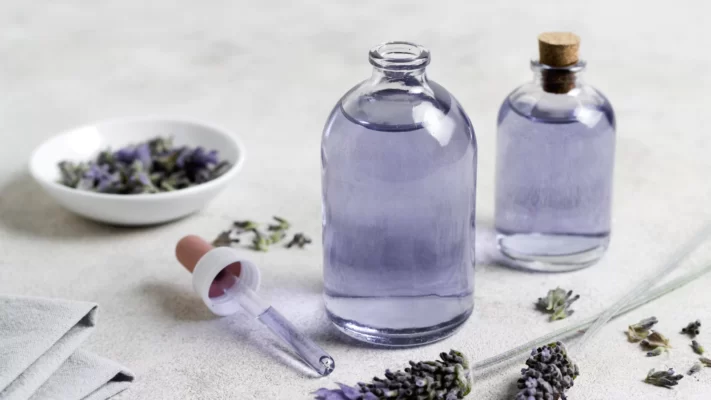
Essential oils have long been used in alternative therapies for various ailments, and varicose veins are no exception. Among the myriad of oils available, five stand out as particularly effective for varicose vein relief:
- Lavender oil
- Horse chestnut oil
- Sea pine oil
- Grape vine oil
- Yarrow oil
We will examine each of these oils along with their specific benefits for treating varicose veins.
Lavender Essential Oil
Lavender oil, known for its calming and soothing properties, offers relief for those suffering from varicose veins. Its benefits include:
- Anti-inflammatory properties
- Antioxidant properties
- Antispasmodic properties
- Analgesic properties
These properties help reduce pain and skin ulcers associated with varicose veins. The oil’s effectiveness in alleviating varicose vein symptoms can be attributed to its ability to alter levels of neurotransmitters, such as serotonin and GABA, which are associated with pain relief.
To apply lavender essential oil for varicose vein relief, follow these steps:
- Mix 10 drops of lavender oil with 5 drops of cypress oil in 20ml of bath oil or bath & shower gel.
- This mixture can be used to shower the affected legs or directly applied to the affected areas.
- Remember to use lavender oil responsibly and in proper dilution to prevent skin irritation or allergic reactions.
Horse Chestnut Essential Oil
Horse chestnut oil is another powerful option for varicose vein relief. Studies have shown that it can effectively reduce swelling, pain, and itchiness associated with varicose veins when applied topically or taken orally. The primary active ingredient in horse chestnut essential oil, aescin, has anti-inflammatory properties and is capable of improving vein tone.
For best results, horse chestnut oil should be diluted with a carrier oil, such as sweet almond oil, before application. The diluted mixture can be massaged onto the affected area to provide temporary pain relief. Be sure to consult with a medical professional before using horse chestnut oil as a varicose vein treatment and always perform a patch test to ensure no allergic reactions occur.
Sea Pine Essential Oil
Sea pine oil, derived from the needles of the pine maritime tree, possesses anti-inflammatory, antioxidant, antispasmodic, and analgesic properties. These qualities make it an effective choice for reducing leg swelling and alleviating varicose vein symptoms. A study compared sea pine bark oil to horse chestnut extract. The results showed that sea pine oil was more effective in reducing edema caused by chronic venous insufficiency. This condition can result in varicose veins..
To experience the benefits of sea pine essential oil, ensure it’s properly diluted with a carrier oil like coconut oil, and apply it to the affected area. As with any essential oil, exercise caution and consult with a healthcare professional before using sea pine oil as a varicose vein treatment.
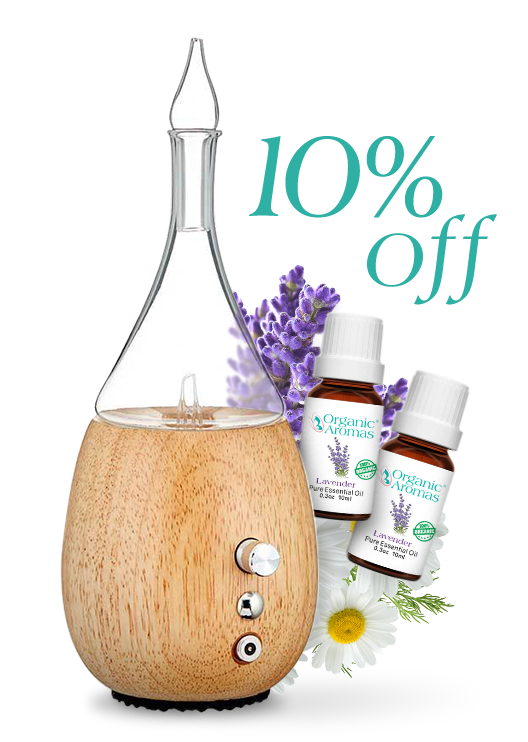
Join Now and Get a Coupon for 10% Off!
Grape Vine Essential Oil
Grape vine oil is another excellent choice for those seeking relief from varicose veins. The oil contains an extract called proanthocyanidin, which has been found to:
- Reduce lower leg swelling related to venous insufficiency
- Possess anti-inflammatory properties
- Possess antioxidant properties
- Possess antispasmodic properties
- Possess analgesic properties
These properties may provide relief from varicose veins.
For effective use of grape vine essential oil, follow these steps:
- Combine a few drops of grape vine essential oil with a carrier oil like olive oil.
- Apply the mixture to the affected area.
- Remember to dilute essential oils and consult with a healthcare professional before introducing grape vine oil into your varicose vein treatment regimen.
Yarrow Essential Oil
Yarrow oil has been noted to possess anti-inflammatory, antioxidant, antispasmodic, and analgesic properties, which may be beneficial for varicose vein relief. This versatile oil can help reduce inflammation, increase blood flow, and strengthen blood vessel walls, thereby improving symptoms of varicose veins.
However, yarrow oil must be used with caution and properly diluted before application. To use yarrow oil effectively, mix a few drops with a carrier oil, such as jojoba oil, and apply it to the affected area.
As always, consult with a healthcare professional before incorporating yarrow oil into your varicose vein treatment plan.

How Essential Oils Support Blood Circulation
Essential oils play a crucial role in supporting blood circulation, which can help alleviate varicose vein symptoms. Their vasodilation effects help increase blood flow and reduce inflammation, while their ability to strengthen blood vessel walls further promotes overall vascular health.
We will further explore these two mechanisms and their impact on blood circulation.
Vasodilation Effects
The vasodilation effects of essential oils, such as rosemary essential oil and eucalyptus, help increase blood flow and reduce inflammation by widening blood vessels. Research has shown that compounds like citral, limonene, menthol, aristolone, and kanshone H possess notable vasodilation properties, contributing to the effectiveness of these oils in promoting blood circulation.
Several studies have been conducted to validate the vasodilation effects of essential oils, including research on asafoetida, citral, and Pectis brevipedunculata. These findings suggest that certain essential oils have the capacity to dilate blood vessels, improving circulation and vascular health, making them a promising option for individuals seeking natural varicose vein relief.
Strengthening Blood Vessel Walls
In addition to promoting vasodilation, essential oils can also help strengthen blood vessel walls, which is essential for improved circulation and reduced varicose vein symptoms. Although the exact mechanism is not yet fully understood, studies suggest that essential oils may have a beneficial effect on endothelial function, vasorelaxation, and blood circulation.
Lavender, horse chestnut, and sea pine essential oils, in particular, have been found to possess properties that aid in reducing inflammation, increasing blood flow, and reducing oxidative stress. These benefits contribute to the strengthening of blood vessel walls and overall vascular health, making essential oils an attractive option for varicose vein relief.

Join Our Exclusive Member Club to get Big Discounts!
Risks and Precautions When Using Essential Oils

While essential oils can provide significant varicose vein relief, it’s necessary to be aware of possible risks and precautions when using them. One of the primary concerns when using essential oils is skin irritation and allergic reactions. To avoid any adverse effects, always perform a patch test before using essential oils and ensure proper dilution with a carrier oil, such as coconut or olive oil.
In addition to skin irritation, some individuals may experience allergic reactions to essential oils, such as:
- allergic contact dermatitis
- itchiness
- sneezing
- difficulty breathing
Always consult with a medical professional before incorporating essential oils into your varicose vein treatment plan, and discontinue use immediately if any adverse reactions occur.
Natural Remedies and Lifestyle Changes for Varicose Veins

In addition to essential oils, there are numerous lifestyle changes and natural remedies that can help manage and prevent developing varicose veins. Regular exercise, such as running, biking, or swimming, can strengthen leg muscles and enhance blood circulation, reducing symptoms associated with varicose veins. Maintaining a healthy weight is also vital since it reduces pressure on the veins and enhances blood circulation.
Wearing compression stockings is another effective measure for managing varicose veins. These specially designed garments provide gentle pressure to the legs, reducing swelling and discomfort associated with the condition. By incorporating these lifestyle changes and natural remedies into your daily routine, you can take a proactive approach towards managing varicose veins and improving your overall vascular health.
Medical Treatments for Varicose Veins

While essential oils and lifestyle changes can provide relief from varicose veins, some individuals may require medical intervention to treat their condition more effectively. Sclerotherapy, laser ablation, and endovenous embolization are medical treatments commonly used to address varicose veins.
We will examine each of these procedures along with their benefits.
Sclerotherapy
Sclerotherapy is a safe and effective procedure for treating varicose and spider veins, particularly in the legs. It involves injecting a solution directly into the veins, causing them to collapse and eventually fade within a few weeks. The injected solution, which can be:
- hypertonic saline
- sodium tetradecyl sulfate
- polidocanol
- chromated glycerin
Irritates the vein walls, causing them to swell and stick together.
Recovery from sclerotherapy includes the following guidelines:
- Patients can typically resume their regular activities immediately after treatment.
- Strenuous activities should be avoided for up to five days.
- Compression garments should be worn for at least four weeks post-procedure.
Sclerotherapy is a popular option for individuals seeking minimally invasive varicose vein treatment, offering both cosmetic and symptomatic relief.
Laser Ablation
Laser ablation, also known as endovenous laser therapy, is a minimally invasive treatment option for varicose veins. This procedure entails:
- Inserting a laser fiber into the affected vein through a small incision
- Activating the laser to deliver energy to the vein wall
- Causing the vein to collapse and seal shut
This helps improve blood circulation by redirecting blood flow to healthier veins, reducing the appearance and symptoms of varicose veins.
The recovery period following laser ablation is minimal, with patients able to resume their regular activities immediately after treatment. Laser ablation is an attractive option for those seeking a quick and minimally invasive solution to their varicose vein concerns.
Endovenous Embolization
Endovenous embolization is another minimally invasive procedure used to treat varicose veins. It involves:
- Inserting a catheter into the affected vein
- Using techniques such as laser or radiofrequency waves to seal off the vein
- Redirecting blood flow to healthier veins
This procedure effectively reduces the visibility of varicose veins and alleviates associated symptoms.
The recovery process following endovenous embolization can vary, but it generally takes about 1-2 weeks for a full recovery. It is important to adhere to your doctor’s instructions for a successful recovery. As with other minimally invasive treatments, endovenous embolization offers an effective alternative to traditional surgical options for varicose vein treatment.
Summary
Essential oils can provide significant relief for those suffering from varicose veins. Lavender, horse chestnut, sea pine, grape vine, and yarrow oils each offer unique benefits in promoting blood circulation, reducing inflammation, and alleviating pain. Alongside essential oils, lifestyle changes such as regular exercise, maintaining a healthy weight, and wearing compression stockings can also help manage varicose veins.
It is important to remember that essential oils should be used responsibly and in proper dilution to avoid any skin irritation or allergic reactions. Always consult with a healthcare professional before incorporating essential oils into your varicose vein treatment plan. With the right combination of essential oils, lifestyle changes, and medical treatments if necessary, you can take control of your varicose vein symptoms and improve your overall vascular health.
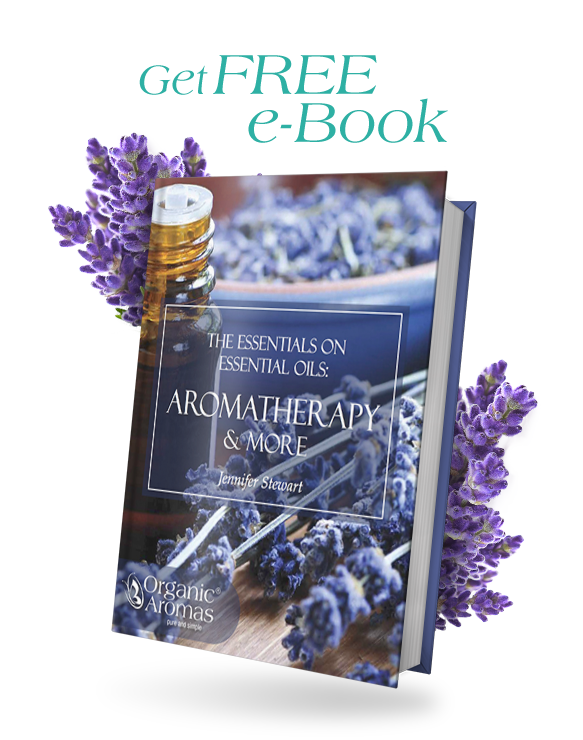
Sign Up to Get Your FREE
e-Book Here…
Frequently Asked Questions
What essential oils are good for varicose veins?
Essential oils like Cypress, Juniper, and Geranium have been reported to help reduce the appearance of varicose veins when used topically. Using these essential oils could be a beneficial way to lessen the effects of varicose veins.
How can I shrink my varicose veins naturally?
Exercise regularly, wear compression stockings, elevate your legs when you have the time and consider dietary changes such as incorporating ginger, garlic, and cayenne pepper into your diet to naturally shrink your varicose veins.
Which essential oil is best for circulation?
Ginger and cinnamon essential oils have been shown to be the most beneficial for improving circulation. Their warming and stimulating properties make them great for massages or diffusion.
What are the potential side effects of using essential oils for varicose veins?
Potential side effects of using essential oils for varicose veins include skin irritation and allergic reactions, such as allergic contact dermatitis, itchiness, sneezing, or difficulty breathing. It is important to test a small area of skin before use and consult with a healthcare professional.
Are compression stockings effective in managing varicose veins?
Compression stockings are an effective way to manage varicose veins, as they can reduce swelling and discomfort by providing gentle pressure to the legs.

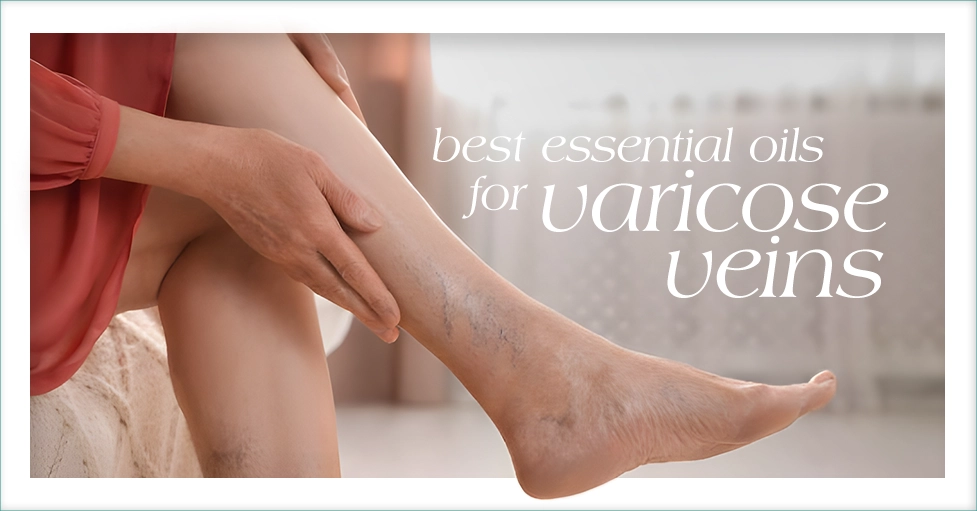
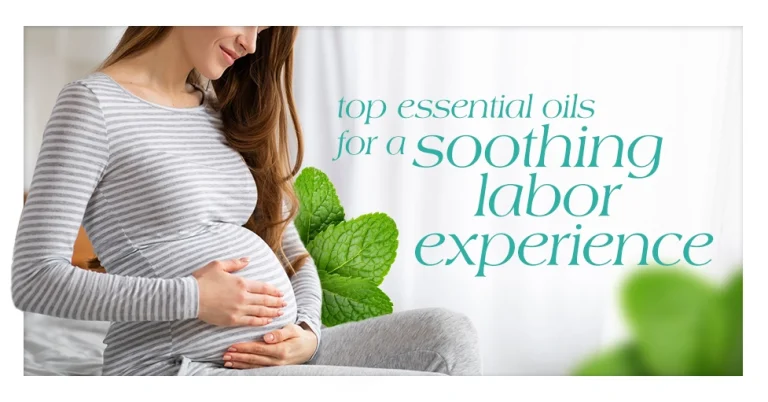
Great Information. I have had varicose veins most of my life Super article! Very interested in your products.
I am treating a friend with cypress, rose geranium and lemon and the results are amazing. I dilute the oils in a base mix of calendula which helps with the itching and swelling and sweet almond . Lovely article .
After I gave birth to my second son, varicose and spider veins started to appear on my legs. Actually, I was really worried so I went to the doctor as soon as I could he recommended Venorid treatment for varicose veins, and it is amazing!
Great Information. I have had varicose veins most of my life. I will be trying the essential oils you recommend. Thank you!
Great read! Lots of good info here 🙂
My husband has an extensive amount of varicose veins. He’s had injections more than once. I would love to try this just because they might at least make his legs feel better.
I love using essential oils to cure things or help with symptoms.
Very helpful.
wow! there are so many amazing remedies. Love the in depth information.
wow – i never realized what a serious problem this is
Good to know great facts
I love that essential oils can help with this issue. I did not know that before.
I am just starting to learn about essential oils.
Never tried this, good to know.
I don’t have vericose veins, yet anyway but this is great information to have! Thank You!
Wow what an informative post. Thanks for sharing!
Super article! Very interested in your products.
I would love to try this on my varicose veins.
I was just diagnosed with venous reflux , so I’m anxious to try these oils!
Sounds like it’s time for me to order some geranium oil! Very interesting article. FYI, varicose veins are hereditary, as well. Thanks.
i never knew varicose veins could be helped with oils,thanks for the tips
Very informative, wasn’t aware of this until I read this blog. Thanks
Very informative article. I would never guess that essential oils could help this problem. Thanks for sharing!
Oils have been utilized as homeopathic even in caveman era days of medical and health applications
Nice info. Never knew there’s something like this, and it’s good to know we have the cure!
I have this problem in my ankle I broke 13 years ago. Very interesting article. Thanks!
Very useful!
Thanks for the great info !
Wow! Didn’t realize oils could be used for this. I stand all day for work. Good to know!
Great
These are good and really worth a try! Lemon is my favorite scent and fruit too.
I really like what i’m hearing about using essential oils
I didn’t know that lemongrass helps to dilate blood vessels. Thanks!
I’m glad I found this article! I’m starting to get a few and had no idea essential oils could help with that! 🙂
Thank you for all the information. I had no idea essential oils could be used for varicose veins.
I had no idea essential oils were used for varicose veins.
good to know that oils will help
I had never heard of essential oils being used for this! They really can be used for just about anything.
I had no idea essential oils would help this.
I do not have Vericose veins yet, but I do have a very sedentary lifestyle. This was great information for the future.
I will definitely be purchasing some rose geranium and lemon essential oil. I knew that essential oils help with a lot of ailments but no idea varicose veins. Great information!
Great article! Thanks for the tips!
This article came at the perfect time. My husband has been having trouble with varicose veins due to being on his feet 13-15 hours a day for work. We are going to try this!
Thanks for sharing.
Recently lost a bunch of weight and I have veins popping all over the place! Not a look I am all that in to to be honest. Wonder if these tips will work for me as well